九年级英语全册Unit4IusedtobeafraidofthedarkSectionA(1a2d)课件(新版)人教新目标版
人教版英语九年级Unit4《Iusedtobeafraidofthedark》全单元说课稿

人教版英语九年级Unit 4《I used to be afrd of the dark》全单元说课稿一. 教材分析人教版英语九年级Unit 4的主题是“I used to be afrd of the dark”,通过讲述一个人过去害怕黑暗,但现在不再害怕的故事,引导学生学习一般过去时态和过去习惯的表达方式。
本单元还包括两个任务,分别是讨论过去的习惯和谈论过去发生的事情。
教材内容丰富,贴近学生生活,有利于激发学生的学习兴趣和积极性。
二. 学情分析九年级的学生已经掌握了基本的英语语法和词汇,具备一定的听说读写能力。
但他们对过去时态的理解和运用还不够熟练,需要通过本节课的学习进一步巩固。
此外,部分学生可能在表达自己的过去经历时存在语言障碍,需要教师的引导和鼓励。
三. 说教学目标1.知识目标:学生能够掌握一般过去时态的构成和用法,学会表达过去的习惯和经历。
2.能力目标:学生能够运用一般过去时态进行交流,提高口语表达能力。
3.情感目标:学生能够克服恐惧,积极面对生活中的困难。
四. 说教学重难点1.重点:一般过去时态的构成和用法。
2.难点:过去习惯的表达方式和过去发生的事情的描述。
五. 说教学方法与手段1.情境教学法:通过设定情境,让学生在实际语境中学习和运用一般过去时态。
2.任务型教学法:通过完成两个任务,引导学生积极参与课堂活动,提高口语表达能力。
3.合作学习法:学生分组讨论,互相交流,共同完成任务。
4.激励评价法:教师及时给予鼓励和评价,激发学生的学习兴趣和自信心。
六. 说教学过程1.导入:教师通过提问学生是否有过害怕黑暗的经历,引出本节课的主题。
2.新课呈现:教师通过讲解和示范,教授一般过去时态的构成和用法。
3.实践环节:学生分组讨论过去的习惯和经历,用一般过去时态进行交流。
4.任务一:学生分组完成第一个任务,讨论过去的习惯,并展示给其他小组。
5.任务二:学生分组完成第二个任务,谈论过去发生的事情,并展示给其他小组。
九年级英语全册 Unit 4 I used to be afraid of the dark Se
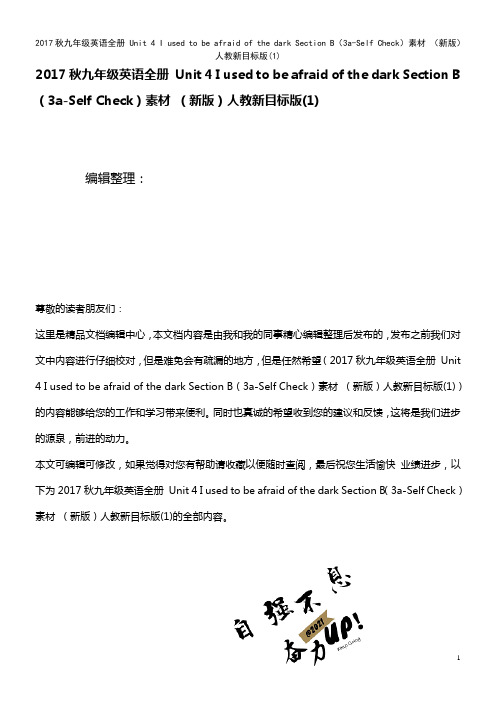
2017秋九年级英语全册Unit 4 I used to be afraid of the dark Section B (3a-Self Check)素材(新版)人教新目标版(1)编辑整理:尊敬的读者朋友们:这里是精品文档编辑中心,本文档内容是由我和我的同事精心编辑整理后发布的,发布之前我们对文中内容进行仔细校对,但是难免会有疏漏的地方,但是任然希望(2017秋九年级英语全册Unit 4 I used to be afraid of the dark Section B(3a-Self Check)素材(新版)人教新目标版(1))的内容能够给您的工作和学习带来便利。
同时也真诚的希望收到您的建议和反馈,这将是我们进步的源泉,前进的动力。
本文可编辑可修改,如果觉得对您有帮助请收藏以便随时查阅,最后祝您生活愉快业绩进步,以下为2017秋九年级英语全册Unit 4 I used to be afraid of the dark Section B(3a-Self Check)素材(新版)人教新目标版(1)的全部内容。
Unit 4 I used to be afraid of the dark Section B-2 Class Type Reading and writingObjectives 1.To understand the passage about the student Li Wen。
2.To complete and better understand the retelling of thepassage.3.To introduce to your classmates about the changesabout yourself from past to now。
Key structure 1.He studies harder than he used to。
2.They're always proud of me。
初三英语Unit-4-I-used-to-be-afraid-of-the-dark课文及详解
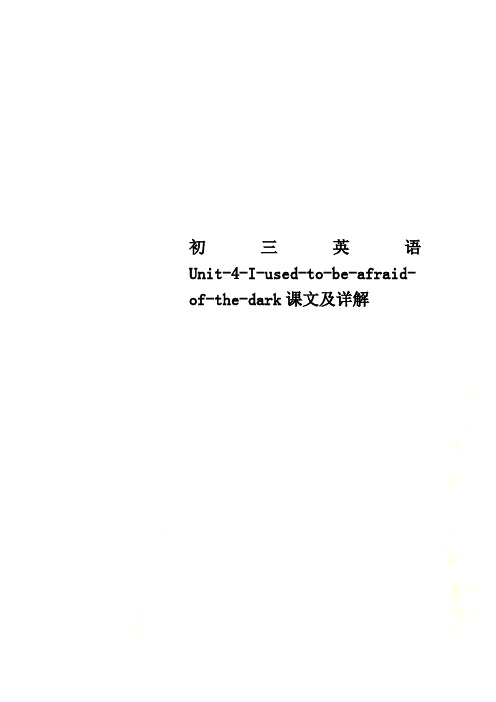
初三英语Unit-4-I-used-to-be-afraid-of-the-dark课文及详解Unit 4 I used to be afraid of the darkLanguage Goal:Talk about what you used to be likeSection A1a Fill in the chart with words to describe people. Appearance 外表Personality 个性Tall 高个的Outgoing 外向的straight hair 直发Funny 滑稽的,有趣的Yes, I did.used to和would①used to和would都可表示过去的习惯或行为,常可换用。
When we were children we used to/would go skating very winter. 我们小时候每年冬天都去滑冰。
②used to含有较强的“今昔对比”的含义I do not swim so often as I used to我不像过去那样常游泳了。
而used to则可无时间状语used to do和be used to doing.①be used to 是“习惯于”某一客观事实和状态,不强调动作,to是介词,后面接名词或动名词,I am used to the weather here.我已经习惯于这里的天气了。
He is used to hard work. 他习惯于艰苦的工作。
②get(或become)used to指的是从不习惯到习惯这一过程的转变,另外,它往往包含着克服困难去适应的意思。
如:You will soon get used to the weather here.你会习惯于这里的天气的。
In the end, I got used to doing the hard work.最后,我终于习惯干苦活了。
九年级-unit-4-I-used-to-be-afraid-of-the-dark-课文重难点讲解

Unit 4 I used to be afraid of the dark.Section A 课文重难点精讲精选【解析1】:1. use v.使用→useful adj. 有用的 use up 用完Eg: Studying English is__________(use).2. use sth to do sth 用某物做某事Eg:We use Internet __________(find) information.3. used to do sth 过去常常做某事,表示过去做过的事现在已经不做,只用于过去时态。
◆变成否定句或疑问句时要借助助动词didn’t/did【拓展】:1. 肯定形式:主+used to+do… Eg: I used to get up at six.2. 否定形式:主+ usedn’t /didn’t use +to do … Eg: He usedn’t to study hard.= He didn’t use to study hard.3. 疑问形式:① Used +主语+ to do sth … 答语: Yes, 主语+used to./ No, 主语+ usedn’t to② Did + 主语+ use + to do …. 答语: Yes,主语+ did./ No, 主语+ didn’tUsed he to go to school on foot= Did he use to go to school on foot4. 反意疑问句:①肯定句+ didn’t /usedn’t+ 主语 Eg: He used to be very rich, didn’t he/ usedn’t he②否定句+ did /used +主语 Eg: He didn’t use to smoke, did /used he练习:① My mother used_________(tell)us story when we were young. ( )② He used to ____short and ____ short hair when he was young. ( )A. have; beB. be; haveC. be; beD. have; have【辨析】:辨析:used to do something.,be used to do something.与be used to doing something.1. used to do sth. “过去常常做某事”(而现在已经不做了),表示过去习惯性、经常性的动作或状态,和现在对比,暗示现在不做了。
【人教版】2020九年级英语全册 Unit 4 I used to be afraid of the dark Section A

Unit 4 I used to be afraid of the dark. Section Athe morning.让孩子们小点声,保持安静。
②silent “声音极小的、沉默的、寡言的”。
如:John is a silent,thoughtful boy. 约瀚是个不爱讲话,喜欢思考的孩子。
The house was silent because everyone was asleep.房子里很安静,所有的人都睡着了。
3. She still plays the from time to time. 她依旧不时地弹奏。
from time to time 为介词短语,意为“时不时地”。
同义词组为sometimes,at time。
例如:The temper gets the best of him from time to time. 他有时控制不住自己的脾气。
From time to time he fired questions at me. 他不时向我提出许多问题。
归纳有关time的短语:on time准时;in time 及时;all the time一直;kill the time 消磨时间have a good time玩得开心;once upon a time 从前;很久很久以前4. It’s been three years since we last saw our primary school classmates.距离我们最后一次见到小学同学已经三年了。
(1)该句型是:It is(has been)+时间+since+持续性动词的过去时,表示“自从……以来到现在已有多久。
”例如: It has been quite some time since I was last in London.我上次离开伦敦至今颇有一段时间了。
还可用于句型:It was+时间+since+持续性动词的过去完成时,表示“从……到过去某时间点以来”。
人教版英语九年级Unit 4《I used to be afraid of the dark》全单元

人教版英语九年级Unit 4《I used to be afrd of the dark》全单元教学设计一. 教材分析人教版英语九年级Unit 4的主题是“I used to be afrd of the dark”,主要讲述了人们过去和现在的变化。
本单元包括两个部分:Part A和Part B。
Part A包含一个听力任务、一个口语任务和三个阅读任务,而Part B包含一个口语任务、两个阅读任务和一个写作任务。
教材内容丰富,旨在提高学生听说读写四项基本技能,同时培养他们的文化意识和跨文化交流能力。
二. 学情分析九年级的学生已经具备了一定的英语基础,能够运用所学知识进行简单的交流。
但是,他们在词汇、语法和听力方面还存在一定的困难。
因此,在教学过程中,教师需要关注学生的个体差异,充分调动他们的学习积极性,激发他们的学习兴趣。
三. 教学目标1.知识目标:学生能够掌握本单元的重点词汇和语法知识,正确运用一般过去时描述过去和现在的变化。
2.能力目标:学生能够在不同情境下运用所学知识进行听说读写操作,提高他们的语言运用能力。
3.情感目标:学生能够了解并尊重文化差异,培养跨文化交流的能力。
四. 教学重难点1.重点:本单元的重点词汇和语法知识,以及一般过去时的运用。
2.难点:一般过去时的运用,以及如何在实际情境中进行跨文化交流。
五. 教学方法1.任务型教学法:通过完成各种任务,激发学生的学习兴趣,提高他们的实践能力。
2.情境教学法:创设真实的情境,帮助学生理解并运用所学知识。
3.交际法:鼓励学生积极参与课堂交流,提高他们的口头表达能力。
六. 教学准备1.教师准备:备好相关教学材料,如PPT、听力材料、阅读材料等。
2.学生准备:预习本单元内容,完成相关的自主学习任务。
七. 教学过程1.导入(5分钟)教师通过提问方式引导学生回顾上一单元学过的内容,激发学生的学习兴趣。
例如:“Do you remember what we learned in the last unit? How was your weekend?”2.呈现(10分钟)教师通过展示PPT或实物,呈现本节课的主题“I used to be afrd ofthe dark”,引导学生关注一般过去时的运用。
九年级英语全册 Unit 4 I used to be afraid of the d

3b Write about how you have changed. What did you use to be like? Which change is the most important one,and why?
Try to write two paragraphs:
1. General introduction about the changes
1 Fill in the blanks with the correct
forms of the words in the box.
silent require absent fail interview take pride in be proud of in person influence humorous seldom
4. The teacher _t_o_o_k__p_r_id_e__o_f_ helping his students win the English competition.
5. Kate’s grandparents have had a great __i_n_f_lu_e_n_c_e___ on her.
Unit 4Biblioteka I used to be afraid of the dark.
Section B
3a-Self Check
Please tell us what things you used to like doing when you were a child.
play with my friends
When I was a child, I used to like playing with my friends.
九年级英语全册必考话题作文Unit4Iusedtobeafraidofthedark素材
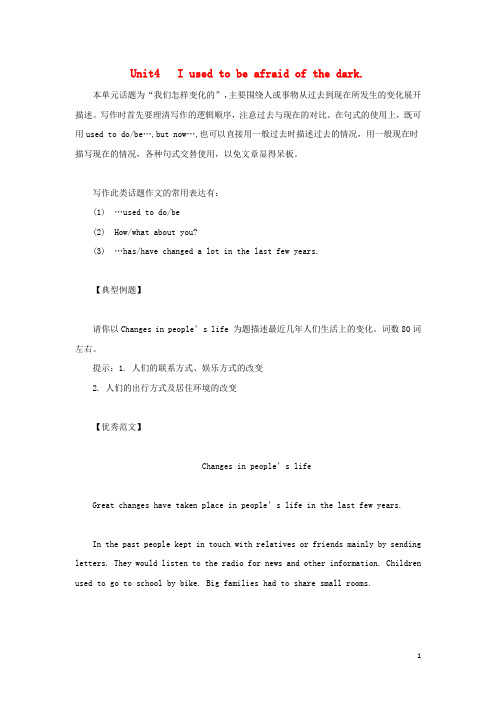
Unit4 I used to be afraid of the dark.本单元话题为“我们怎样变化的”,主要围绕人或事物从过去到现在所发生的变化展开描述。
写作时首先要理清写作的逻辑顺序,注意过去与现在的对比。
在句式的使用上,既可用used to do/be…,but now…,也可以直接用一般过去时描述过去的情况,用一般现在时描写现在的情况,各种句式交替使用,以免文章显得呆板。
写作此类话题作文的常用表达有:(1) …used to do/be(2) How/what about you?(3) …has/have changed a lot in the last few years.【典型例题】请你以Changes in people’s life 为题描述最近几年人们生活上的变化。
词数80词左右。
提示:1. 人们的联系方式、娱乐方式的改变2. 人们的出行方式及居住环境的改变【优秀范文】Changes in people’s lifeGreat changes have taken place in people’s life in the last few yea rs.In the past people kept in touch with relatives or friends mainly by sending letters. They would listen to the radio for news and other information. Children used to go to school by bike. Big families had to share small rooms.Now people can talk to others by telephone or on the internet at home. When they are free, they watch the news and other programs on TV. Some families are rich enough to send their children to school in their own cars. More and more people live in big and bright apartment with several rooms.In a word, people live better than before.。
九年级英语全册 Unit 4 I used to be afraid of the dark The

Unit 4 I used to be afraid of the dark.The fourth periodⅠ. Teaching Aims and Demands1. Knowledge Objects(1) Key Vocabularyspider, insect, chew, gum(2) Target LanguageI used to eat candy all the time. Did you?Yes, I did. And I used to chew gum a lot.2. Ability ObjectTrain students’ ability to talk about what they used to be/do.3. Moral ObjectPeople surely change. Students should take good care of the process of their growth.Ⅱ. Teaching Key Points1. Key Vocabularyspider, insect, chew, gum2. Target LanguageI used to eat candy all the time. Did you?Yes, I did. And I used to chew gum a lot.Ⅲ. Teaching Difficult PointTalk about what you used to be/do.Ⅳ. Teaching MethodPractice methodⅤ. Teaching Aids1. A tape recorder2. A picture with spiders and a picture with insects.3. A gumⅥ. Teaching ProceduresStep 1 RevisionCheck homework. Invite different students to report what his/her grandparents, parents, aunts, uncles, or old friends used to be afraid of when they were young. Step2 1aThis activity introduces new vocabulary words and provides practice with the target language.Using pictures, teach students to practice the words spider and insect. Teach the word gum by holding up a gum. And teach the verb chew by chewing the gum.Ask students to complete the work individually.Check the answers by inviting different students to report his/her work like this: When I was a child, I used to like painting pictures and singing in music class. Say each number to the class and ask students to raise their hands for each thing they used to like to do. Then discuss the results with the class.Step 31bThis activity provides practice with the target language.Point out the box under the pictures.Read the instructions to the class. Say,You are to write some other things that you used to like to do when you were a children on the lines in the box. Remind students to write sentences.As students work, move around the room offering language support and helping them with any words they want to use.Get a student to write his/her sentences on the blackboard. Help correct any errors. Sample answers1. I used to play football with my brother.2. I used to eat hamburgers a lot.3. I used to watch cartoons.4. I used to run with my father in the morning.Step 4 2a 2bThis activity provides listening practice using the target language.Set a time limit of one minute. Ask students to look through the sentences in thebox.Say, You will hear a boy and a girl talking about how life used to be when they were much younger on the recording. Listen and check the sentences you hear.Point out the sample answer. Play the recording for the first time. Students only listen.Play the recording again. This time students check the sentences they hear. Check the answers.AnswersChecked sentences: 1,2,3TapescriptGirl 1: My six-year-old brother started school this week.Boy 1: He’s really lucky. Life was great when I was six.Girl 1: Really? Why?Boy 1: Oh, schoolwork was really easy.Girl 1: Not for me. I didn’t use to like tests. Now I don’t worry about tests. Boy 1: And we used to play every day after school. Now we just study all the time. Girl 1: Yeah, but we used to walk to school. Now we have to take the bus.Boy 1: I remember one thing. I used to hate gym. Now I love gym class.Girl 1: Me, too.Step 5 2cThis activity provides oral practice using the target language.Ask a pair of students to read the sample conversation to the class.Optional activityAsk students to talk about good and bad habits. Then make sentences with “used to”to show which habits they have stopped and make sentences with “still” to show which ones they still have.Step 6 Summary and HomeworkSay, In this class, we’ve learned the new vocabulary words spider, insect, gum and chew and the target language I used to do sth. After class, finish writing the sentences in Optional Activity.The fifth periodStep 1 Fill in each blank with correct words givenStep 2 Use phrase “used to ” to write about Yu MeiStep 3 ReadingMartin Murray is a fifteen-year-old boy. He used to be a “problem child”,(1) . He didn’t use to give hismother many problems. However, after his father’s death a few years ago, Martin’s life became much more difficult. His mother couldn’t afford to pay for her child’s education. To do this, she had to work, and so was not often at home. His mother looked after him as well as she could.Unfortunately, Martin still cause d problems for himself and his family. He was not interested in studying, and he often got into trouble with the police.Luckily, his mother was very patient, (2) . Inthe end, she made a difficult decision: to send him to a boy’s boarding school.Martin hated it and used to cause a lot of trouble. One day, he told his teacherhe wanted to leave the school. (3) . The head teacher said it was necessary to talk with his mother. Martin called his mother, but to his surprise, this phone call changed his life. “It was exactly what I needed,” he said. “My mother helped me to understand how much she had given me. She also told me that even though my father was no longer with us, he was watching me, and would always take pride in everything good I do.(4) . I realize that since my father died,I have been afraid of being alone, and have tried to make my mother pay moreattention to me.” Now Martin has really changed. He has been working hard, and he is now a top student in his class. (5) . His mother’s love helped him to feel good about himself, and as Martin himself says, “It’s very important for parents to be there for their children.”Step 4 Homework。
人教九年级英语全册口头翻译精练Unit4Iusedtobeafraidofthedark完美
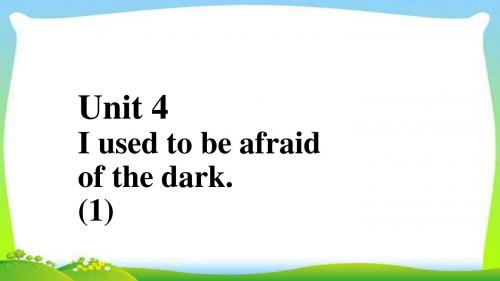
She was also good in music.
她常常弹钢琴。
She used to play the piano.
如今她对运动更加感兴趣,
But now she’s more interested in sports.
她几乎每天都踢足球, She plays soccer almost every day.
后来在全校师生面前歌唱。
And then for the whole school.
Yeah, his face always turned red when he talked to girls.
我以前看他每天在图书馆看书。
I used to see him reading in the library every day.
那是因为他确实是个好学生,
That’s because he was a really good students.
她也是游泳队员。
She’s also on a swim team.
如今她还常常弹钢琴。
But now she still plays the piano from time to time.
葆拉过去非常内向。
Paula used to be really quiet.
我晓得。在课堂上她一言不发。
Try to be your best.
Unit 4
I used to be afraid of the dark. (2)
This information comes from Yang Xuehui at Shili high school in Xihe, Gansu.
从害羞女孩到流行歌星
Unit4Iusedtobeafraidofthedark知识详解英语九年级上册(人教版)
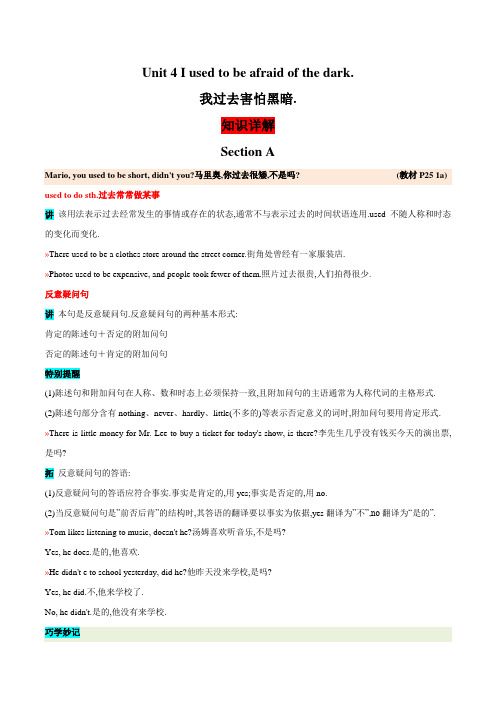
Unit 4 I used to be afraid of the dark.我过去害怕黑暗.知识详解Section AMario, you used to be short, didn't you?马里奥,你过去很矮,不是吗? (教材P25 1a) used to do sth.过去常常做某事讲该用法表示过去经常发生的事情或存在的状态,通常不与表示过去的时间状语连用.used不随人称和时态的变化而变化.»There used to be a clothes store around the street corner.街角处曾经有一家服装店.»Photos used to be expensive, and people took fewer of them.照片过去很贵,人们拍得很少.反意疑问句讲本句是反意疑问句.反意疑问句的两种基本形式:肯定的陈述句+否定的附加问句否定的陈述句+肯定的附加问句特别提醒(1)陈述句和附加问句在人称、数和时态上必须保持一致,且附加问句的主语通常为人称代词的主格形式.(2)陈述句部分含有nothing、never、hardly、little(不多的)等表示否定意义的词时,附加问句要用肯定形式. »There is little money for Mr. Lee to buy a ticket for today's show, is there?李先生几乎没有钱买今天的演出票,是吗?拓反意疑问句的答语:(1)反意疑问句的答语应符合事实.事实是肯定的,用yes;事实是否定的,用no.(2)当反意疑问句是”前否后肯”的结构时,其答语的翻译要以事实为依据,yes翻译为”不”,no翻译为“是的”.»Tom likes listening to music, doesn't he?汤姆喜欢听音乐,不是吗?Yes, he does.是的,他喜欢.»He didn't e to school yesterday, did he?他昨天没来学校,是吗?Yes, he did.不,他来学校了.No, he didn't.是的,他没有来学校.巧学妙记反意疑问句反意疑问三要点,前后谓语正相反;短句not如出现,必须缩写是习惯;最后一点应注意,短句主语代词填;回答反意疑问句,答案含义是依据;肯定事实用yes 否定事实就用no.典例1 (龙东中考)It is rude to ask direct questions,________?Yes, but I think it's OK to your close friends.A. isn't itB. doesn't itC. does it解析:问句句意:问直接的问题是粗鲁的,不是吗?反意疑问句遵循”前肯后否,前否后肯”的原则,由前面的It is可知,附加问句应为isn't it.故选A.What's he like now?他现在什么样? (教材P25 1c) What+ be+ sb. like?讲可用来询问人的相貌,也可用来提问人的性格、品质等.»What is your math teacher like?你的数学老师长什么样?He is tall and thin.他又高又瘦.»What's he like?他是个什么样的人?He's outgoing.他很外向.拓(1)" What do/does + sb. +look like?"意为“某人长什么样?”,常用来提问人的相貌.»What does your elder sister look like?你姐姐长什么样?She is of medium build with short hair.她中等身材,留着短发.(2)"What do/does +sb.+like?"意为”某人喜欢什么?”,用来询问某人的喜好.»What does Tom like?汤姆喜欢什么?He likes collecting stamps.他喜欢集邮.humorous 有幽默感的(教材P26 2a) humorous/'hju:mərəs/adj.有幽默感的;滑稽有趣的讲由”humor(n.幽默)+ous(形容词后缀)”构成,在句中可作表语或定语.»What is Ricky like?里基怎么样?»He's humorous. He often tells us funny jokes.他很幽默,他经常给我们讲滑稽的笑话.»Most teenagers like humorous TV shows.大多数青少年喜欢幽默的电视节目.拓humor n. 幽默humorous adj.有幽默感的;滑稽有趣的humorless adj.无幽默感的humorist n.诙谐风趣的人语境串记Our teacher is a humorist. He has a good sense of humor. He always tells us humorous stories, but today's story is humorless.我们的老师是一个诙谐风趣的人.他很有幽默感.他总是给我们讲幽默故事,但是今天的故事不幽默. 词缀学习ous 是常见的形容词后缀,通常放在名词后,表示”有······性质的”.danger(n.危险)+ous→ dangerous(adj.有危险的)silent 沉默的(教材P26 2a) silent/'sailənt/adj.不说话的;沉默的讲在句中作表语或定语.remain/stay/keep silent 保持沉默»I don't like the silent hours of the night.我不喜欢晚上寂静的时间.»Please look at the sign. It says "Keep silent",请看告示牌.上面写着”保持安静”.拓silent adj.silently adv.安静地;沉默地silence n.[U]沉默;寂静in silence安静地(=silently)»A scream broke the silence of the night.一声尖叫划破了寂静的夜晚.»Peter sat on the square silently, tears ing up in his eyes.彼得静静地坐在广场上,眼泪夺眶而出.»They walked on in silence for a while.他们默默地继续走了一会儿.典例2用括号中所给单词的适当形式填空.(2022·龙东中考)Sally is my best friend. She often sits beside me_______ (silent) when I am sad.解析:句意;萨莉是我最好的朋友.当我难过的时候,她经常静静地坐在我身边.此处应用副词形式修饰动词sits,故填silently.helpful 有帮助的(教材P26 2a) helpful/'helpfl/adj.有用的;有帮助的讲由”help(n.帮助)+ful(形容词后缀)”构成.be helpful to sb.对某人有帮助»Can you give us a helpful suggestion? 你能给我们提一个有用的建议吗?拓(1)[形容词]乐于助人的»Millie is helpful and she gets along well with her classmates.米莉乐于助人,她和同学们相处得很好.(2) helpful adj. 有用的;有帮助的反义词helpless adj.无助的helpfully adv. 有用地;有帮助地反义词helplessly adv.无助地helpfulness n.帮助;有用反义词helplessness n无助典例3 用括号中所给单词的适当形式填空.(2022·盘锦中考)I hope this excellent report will be________ (help) in answering your question.答案:helpfulIt's been three years since we last saw our primary school classmates.自从上次我们小学同学见面已经三年了. (教材P26 2d) since 引导的时间状语从句讲本句是含有since引导的时间状语从句的复合句.since在此处作连词,意为”自······以后;从·····以来”.since 引导的时间状语从句常用一般过去时,与其对应的主句常用现在完成时.»They have been friends since they first met.他们自从第一次见面就一直是朋友.拓(1)since[连词]既然;因为引导原因状语从句.»Since you have drunk so much wine, you mustn't drive.既然你喝了这么多酒,那就绝对不能开车.(2)since[介词]自······以后;从······以来后接表示时间的词或短语.»The factory has been here since the 1990s.这家工厂自20世纪90年代以后就在这里了.典例4(2022·十堰中考)Since he was a little boy, he________ in love with music.A. isB. wasC. has beenD. had been解析:句意;他从小就爱上了音乐.本句是含有since引导的时间状语从句的复合句,从句用一般过去时,主句通常用现在完成时,故选C.I used to see him reading in the library every day.我过去常常看到他每天在图书馆看书. (教材P26 2d) see sb. doing sth.看见某人正在做某事辨see sb. doing sth.与se sb.do sth.语境串记I often see Li Ming play basketball with his friends on the playground, but I saw him running alone when I passed by just now.我经常看见李明和他的朋友们在操场上打篮球,但我刚才经过的时候,看见他一个人正在跑步.拓与see用法类似的词还有hear(听见)、watch(观看)、feel(感到)和notice(注意到)等.He studied hard and got good scores on his exams.他学习努力并且在考试中取得了好成绩. (教材P26 2d) score/sko:(r)/n.&v.得分;进球讲score[名词](考试中的)分数,成绩(相当于grade) (游戏或比赛中的)得分,比分[动词](在游戏、比赛或考试中)得分»Through her hard work, she entered Jilin University with a high score of 615 marks in 2011.通过努力,她在2011年以615分的高分考入吉林大学.»The final score was twozero.最终的比分为2:0.»Great cheers went up when he scored in the last minute of the game.当他在比赛的最后一分钟得分时,全场爆发出了热烈的欢呼声.»She scored 98 in the French exam.她在法语考试中得了98分.For this month's Young World magazine, I interviewed 19yearold Asian pop star Candy Wang.为了这个月的《青年世界》杂志,我采访了19岁的亚洲流行歌星王坎迪. (教材P27 3a) interview/'intə(r)vju:/v.采访;面试n.面试;访谈讲(1)[动词]采访;面试interview sb. for sth.为某事采访/面试某人interview sb. about sth.就某事采访某人;就某事与某人面谈»These days we are interviewing some students for the ing art festival.这些天我们在为即将到来的艺术节采访一些学生.»We interviewed Mike about his own cooking.我们就迈克的厨艺采访了他.(2)[名词]面试;访谈»After Su Yiming won his silver medal, his father received an interview.在苏翊鸣获得银牌后,他的父亲接受了采访.»My interview for the job is tomorrow,我的求职面试在明天.拓interviewer n.采访者;主持面试者Interviewee n.被采访者;参加面试者19yearold 19岁的讲基数词yearold为复合形容词,意为“······岁的”.词与词之间必须加连字符”;year用单数形式.该复合形容词通常用在名词前作定语.»During the past summer vacation, a 15yearold boy made a model plane on his own in less than a month.在过去的暑假期间,一个15岁的男孩在不到一个月的时间里独自制作了一架飞机模型.典例5找出句子中的错误并改正.John is a 13yearsold schoolboy.____________________________________________________________________________________________ 解析:分析句子可知,此处表示”约翰是一个13岁的在校男孩”,schoolboy前应用形容词.表示”······岁的”的形容词形式为”基数词yearold", year 用单数形式,故把”13yearsold"改为”13yearold"Asian adj.亚洲(人)的n.亚洲人讲(1)[形容词]亚洲(人)的»How many Asian countries have taken part in the sports meeting?有多少亚洲国家参加了这次运动会?»How is the Asian foot type different from westerners'?亚洲人的脚型和西方人的有什么不同?(2)[可数名词]亚洲人»I saw two Asians at school yesterday.我昨天在学校看见了两个亚洲人.拓(1)Asia[名词]亚洲»China is in Asia.中国位于亚洲.(2)典例6(达州中考)China is________ Asian country, while France is________ European country.A. an; aB. a; anC. an; anD. a; a解析:句意:中国是一个亚洲国家,而法国是一个欧洲国家.Asian的发音以元音音素/ei/开头,其前应用不定冠词an; European的发音以辅音音素/j/开头,其前应用不定冠词a.故选A.Candy told me that she used to be really shy and took up singing to deal with her shyness.坎迪告诉我她过去非常害羞,于是她开始用唱歌来克服她的羞怯. (教材P27 3a) take up 学着做;开始做讲后常跟名词、代词或动词ing形式作宾语.take up doing sth.开始做某事»They have taken up golf.他们开始学起打高尔夫球来了.»He took up farming two years ago.他两年前开始务农.拓take up 还可意为”占据(空间);占用(时间)”.»The new fridge takes up too much room.新冰箱占据了太多空间.»Stop playing puter games. It takes up too much of your time.别玩电脑游戏了,它占用了你太多时间.典例7 (2023·武汉市江岸区期中)Every student is expected to_______ a sporting activity for a healthy life.I couldn't agree more. Health matters a lot.A. deal withB. end upC. take upD. e across解析:句意:”为了健康的生活,每个学生都应该参加体育活动.”“我非常赞同,健康至关重要.”deal with"处理”;end up"结束”;take up“学着做,开始做,占据”;e across"(偶然)遇见”.故选C.deal with 应对;处理讲同义词组是do with,但deal with 与how搭配,do with与what搭配.»How should I deal with this problem?=What should I do with this problem?我该怎样处理这个问题?典例8根据句意及汉语提示填写单词.(2022·无锡中考)It's necessary for us to learn how to_______ (处理)with the stress in our daily life.解析:句意:对我们而言,学会如何应对我们日常生活中的压力是非常有必要的.空处与how to 搭配构成”特殊疑问词+动词不定式”,to后应接动词原形;表示”处理”可用deal with 或do with,结合how 可知应用deal with.故填deal.shyness/'fainəs/n.害羞;腼腆讲[名词]由”shy(adj.羞怯的)+ness(名词后缀)”构成.»Jenny is a girl with a little shyness.珍妮是一个有点儿腼腆的女孩.As she got better, she dared to sing in front of her class...随着她的进步,她敢在全班同学面前唱歌了······(教材P27 3a) dare/dea/,/der/v.敢于;胆敢讲[实义动词]有人称和时态的变化,一般不用于进行时.dare to do sth."敢于做某事”,其否定句和疑问句的构成要借助于助动词do/does/did.»The little girl doesn't dare to ask questions.这个小女孩不敢问问题.拓[情态动词]后接动词原形,常用于否定句或疑问句.»I daren't speak in public.我不敢在公共场合讲话.»Dare she go out alone at night?她晚上敢独自外出吗?in front of 在······前面辨in front of 与in the front of语境串记Jack sits in the front of a red car, and there is a yellow cat in front of the car.杰克坐在一辆红色汽车的前面,而且车前有一只黄猫.in the front of(在内部的前面) in front of(在外部的前面)Now she's not shy anymore and loves singing in front of crowds.现在,她不再害羞了,并且喜欢在众人面前唱歌. (教材P27 3a) not.+ .anymore 不再辨not…anymore 与not…any longer»From then on Rose wasn't scared of snakes anymore,从那时起,罗丝再也不害怕蛇了.»I can't wait for her any longer because I'm going to be late.我不能再等她了,因为我快要迟到了.crowd n.人群;观众»When he lands, the crowd cheers loudly.当他落地时,人群高声欢呼.»Thousands of people crowded the street.成千上万的人挤在街上.»We all crowded round the table.我们都挤在桌子周围.»People always offer their seats to old people on a crowded subway or bus.在拥挤的地铁或公共汽车上,人们总是给老人让座.»Tom and Dick are playing chess, with a crowd of students watching them.汤姆和迪克正在下国际象棋,一群学生在围观.However, too much attention can also be a bad thing.然而,太多的关注也可能是一件坏事. (教材P27 3a) too much 太多辨too much, too many 与much too»Eating too much sweet food will make people get fat.吃太多甜食会使人发胖.»You worry too much.你过于担心了.»There are too many mistakes in this position.这篇作文错误太多.»It won't be much too long before he es back.要不了太长时间他就回来了.巧学妙记too many要记住,其后名词必复数;too much, much too,用法区别在尾部;much后跟不可数,too后可跟形或副.And I don't have much private time anymore.我不再有许多的私人时间. (教材P27 3a) private/'praivat/adj.私人的;私密的讲[形容词]同义词为personal.»Don't let out your private information online.不要在网络上泄露你的私人信息.拓[名词]in private 私下地;单独地»We can talk about this matter in private.我们可以私下谈论这件事.谚Admonish your friends in private; praise them in public.明赞朋,暗谏友.典例9(2022·无锡中考)Cindy, can I look at your notebook? It looks special.Sorry. I usually write down something_______ in it.A. perfectB. practicalC. pleasantD. private解析:句意:”辛迪,我可以看一下你的笔记本吗?它看起来很特别.”“抱歉.我通常在上面写一些私人的东西.”perfect"完美的”;practical"实际的”;pleasant"令人愉快的”;private"私人的”.根据”Sorry"可知,此处表示婉拒,说明笔记本上写有一些私人的东西.故选D.Hanging out with friends is almost impossible for me now because there are always guards around me.现在与朋友们外出对我来说几乎是不可能的,因为老有警卫守在我的周围. (教材P27 3a) guard/ga:(r)d/ n.警卫;看守v.守卫;保卫讲(1)[可数名词]警卫;看守»He works as a security guard in a pany.他在一家公司当保安.(2)[及物动词]守卫;保卫guard against sth.防止/防范/提防某事»The dog was guarding its ower's luggage.狗在守护着主人的行李.»We need to guard against any possible danger around us.我们需要防范周围任何可能的危险.hang out 闲逛»Last Sunday, my elder sister and I hung out in the shopping mall.上周日,我和我姐姐在购物中心闲逛.拓hang的其他常见短语:hang on抓紧;等一下hang up 挂断hang together同心协力hang back留下you have to be prepared to give up your normal life 你必须准备好放弃你正常的生活(教材P27 3a) be prepared to do sth.准备好做某事讲其中prepared 为形容词,意为”准备好;有所准备”.be prepared for sth."为······做好准备”.»We are not prepared to accept these conditions.我们还没准备好接受这些条件.»We have to be prepared for any difficulty.我们必须为任何困难做好准备.拓prepare[动词]使做好准备;把······预备好;使(自己)有准备prepare for...为······做好准备prepare sth.for sb.为某人准备好某物prepare oneself for sth.使某人自己为某事做好准备prepare to do sth.准备做某事»Prepare for the worst, hope for the best, and be unsurprised by everything in between.做最坏的打算,抱最好的希望,对两者之间的一切都不感到惊讶.»Mom prepared a big lunch for us.妈妈为我们准备了一顿丰盛的午餐.»See your sleep as the time you need in order to prepare yourself for an energetic tomorrow.将睡眠时间视为你为迎接精力充沛的明天所需的时间.»We're preparing to go on vacation.我们正准备去度假.give up 放弃讲“动词+副词”型短语,后接名词、代词或动词ing作宾语.名词作其宾语时可以放在两者之间或up之后,代词作其宾语时只能放在give与up之间.»Don't give up the things that belong to you.属于你的东西不要放弃.»Drinking was harmful to his health, so he gave it up.喝酒有害健康,所以他戒掉了.»You ought to give up smoking.你应该戒烟.典例10根据所给汉语和提示词完成句子.(恩施州中考)人们告诫”后浪”(年轻一代),如果他们不努力,世界就会失去希望.(give)The younger generation are told that if they____________ efforts, the world will lose hope.答案:give up makingYou really require a lot of talent and hard work to succeed.你真的需要很多天赋和努力才能成功.(教材P27 3a) Require v.需要;要求讲通常不用于进行时.常用搭配:require sth.需要某物require sb.to do sth.要求某人做某事(sth.)require doing(某事/物)需要······require+ that从句需要·····»If you require strength in either your body or your mind, red may be of some help to you.如果你需要身体或思想上的力量,红色或许对你有些帮助.»The teacher required Tom to keep quiet.老师要求汤姆保持安静.»The car requires washing.这辆汽车需要清洗.»The poor grades require that we(should) work harder.糟糕的成绩需要我们更加努力学习.拓requirement[名词]所需的东西通常用其复数形式requirements.»The main requirements are food and water in that area.那个地区主要的需求是食物和水.Only a very small number of people make it to the top.只有极少数人能登上成功的巅峰. (教材P27 3a)a number of...一些·····;若干·····讲该短语中,number前可用large、small、great等形容词修饰.»There are a great number of books on the shelves,书架上有许多书.辨a number of..,与the number of...»A number of students in our school e from Zhengzhou.我们学校的一些学生来自郑州.»The number of the students in our school is 300.我们学校有300名学生.典例11 (2022·黔东南州中考)In our school library, there________ a number of books on art. The number of the books________ still growing larger and larger.A. is; isB. are; isC. is; areD. are; are解析:句意:在我们学校的图书馆里,有一些关于艺术的书.这类书的数量还在越来越多.”a number of+复数名词”作主语时,谓语动词用复数形式,故第一空填are." the number of+复数名词”作主语时,谓语动词用单数形式,故第二空填is.选B.being alone 独处(教材P28 4c) alone adj.孤身一人的,无伴的辨alone 与lonely典例12 (南充中考)I know old Joe lives________.We are supposed to visit him from time to time. Then, he won't feel_________.A. alone; aloneB. lonely; lonelyC. lonely; aloneD. alone; lonely解析:句意:”我知道老乔一个人住.”“我们应该时不时地去看望他.那样他就不会感到孤独了.”第一空,alone作副词,强调独身一人;第二空,lonely为形容词,指”(感情上)孤独的,寂寞的”.故选D.giving a speech in public 当众作演讲(教材P28 4c)speech n.讲话;发言讲[可数名词]其复数形式是speeches.give/make a speech(on/about...)发表(关于····的)演讲»I am very happy to be here to make a speech today.我很高兴今天能在这里作演讲.拓speechless[形容词]说不出话的»The little boy was speechless with shock.那个小男孩惊得说不出话来.典例13完成句子,每空一词.(2022·通辽中考改编)这个作家兼演讲家现在正在她的家乡做关于中国文化的讲解.The writer and speaker________ _________ _________ _________ on Chinese culture in her hometown now. 答案:is giving/making a speechin public公开地;在别人(尤指生人)面前»We should talk about this matter in public.我们应该公开谈论此事.»It's impolite to speak loudly in public.在公共场合大声说话是不礼貌的.拓public的用法:(1)[形容词]公立的;公众的通常用于名词前作定语.»We can read books in the public library.我们可以在公共图书馆看书.(2)[名词]民众the public"大众;民众”,其作主语时,谓语动词通常用单数形式,在英式英语中也可用复数形式.»The public is/are wondering what has happened.民众想知道发生了什么事.Section BI used to be nervous about tests all the time.我过去总是对考试感到紧张. (教材P29 1e) be nervous about 对·····感到紧张讲其后接名词、代词或动词ing形式作宾语.其中nervous 作形容词,意为”紧张的;不安的”.»I am really nervous about the talent show tonight.我对今晚的才艺表演感到非常紧张.»I am nervous about speaking in your presence.在你面前讲话我很紧张.典例1(2022·荆州中考)I always feel________ when speaking in front of others.Take it easy and be brave.A. gladB. nervousC. proudD. relaxed解析:句意:”在其他人面前讲话的时候我总会感到紧张.”“放轻松,勇敢点.”glad"高兴的”;nervous"紧张的”;proud"自豪的”;relaxed"放松的”.故选B.When he was a little boy, he seldom caused any problems...当他还是一个小男孩时,他很少惹事······(教材P30 2b) seldom/'seldəm/adv.不常;很少讲(1)常表示动作发生的频率较低.在句中位于be动词、助动词或情态动词之后,实义动词之前.»My father is seldom late for work.我爸爸上班很少迟到.»The boy seldom has breakfast. It's a bad habit.这个男孩很少吃早餐.这是个坏习惯.谚Barking dogs seldom bite.吠犬不咬人.(2)seldom 表示否定含义,在反意疑问句中,当陈述部分含有seldom时,附加疑问部分应用肯定形式.»He seldom goes to work by car, does he?他很少开车去上班,是吗?考向点拨seldom的两个主要考查点:一是考查它与其他频度副词的辨析;二是考查含有seldom的反意疑问句中附加问句的形式.Li Wen's unhappiness began to influence his schoolwork.李文的不快乐情绪开始影响他的课业.(教材P30 2b) influence/'influəns/v.&n.影响讲(1)[及物动词]influence sb. to do sth.影响某人做某事»Poems influence people a lot.诗歌对人们影响很大.»What influenced you to take up nursing? 是什么影响你去从事护理工作的?(2)[名词]影响under the influence of...受到······的影响have a(n)...influence on sb.对某人有······影响»The girl chose science under the influence of her mother.受妈妈的影响,这个女孩选择了理科.»Listening to music has a great influence on her.听音乐对她有很大的影响.典例2(2022·包头中考)Why could you write so well?I read a lot, and the works of Ernest Hemingway had a strong_______ on me as a child.A. attentionB. explanationC. situationD. influence解析:句意:”为什么你写作这么好?”“我读了很多东西,小时候欧内斯特·海明威的作品对我影响很大.”attention"注意力”;explanation“解释,说明”;situation"情况”;influence"影响”.故选D.Sometimes he was absent from classes and failed his examinations.他有时旷课并且考试不及格.(教材P30 2b) absent/'æebsənt/adj.缺席;不在讲反义词为present"出席,在场”.be absent from...缺席···»Why is Kate absent from class?凯特为什么没来上课?Oh, she is attending the meeting.哦,她正在参加会议.拓absence[名词]缺席;不在»Will you please take care of my dog during my absence?我不在时,请你帮我照顾一下我的狗好吗?fail/feIl/v.不及格;失败;未能(做到)讲(1)[动词]不及格»I didn't fail the exam; in fact I did rather well!我没有考不及格,事实上,我考得很不错!(2)[动词]失败;未能(做到)fail in sth.在······方面失败fail to do sth.未能做某事»Although he failed many times, he never gave up his dream.尽管他失败了很多次,但是他从来没放弃过他的梦想.»I failed in my attempt to persuade her.我未能说服她.»She failed to get into art college.她未能进入艺术学院.拓failure[名词]失败;失败的人(或事物)谚Failure i the mother of success,失败是成功之母.»He was a failure as an actor.他当演员并不成功.典例3 (深圳中考)Miss Wang, I'm sorry I am late because I________ to catch the early bus.It doesn't matter. You'd better e to school earlier next time,A. neededB. failedC. managed解析:根据题干中的”抱歉我迟到了”以及”你下次最好早点到学校来”可推断,”我”未能赶上早班公交车,fail to do sth.意为”未能做某事”.故选B.examination n.考试;审查讲[可数名词]可缩写为exam.take an examination 参加考试pass an examination 考试合格fail an examination 考试不合格»We are going to take an examination/exam next Friday.下周五我们将要参加一场考试.»It's exciting that all my classmates have passed the examination/exam.令人兴奋的是我所有的同班同学都通过了考试.Finally, Li Wen's parents made the decision to send him to a boarding school.最终,李文的父母决定送他去寄宿学校. (教材P30 2b) make a/the decision 做决定讲相当于decide. make a/the decision to do sth.=decide to do sth.,意为”决定做某事”.»He made a decision( = decided) to stay and see what would happen next.他决定留下来看看接下来会发生什么. 拓在短语make a decision 中,decision 前还可加形容词.如:make a big decision 做出重大决定,make a final decision 做出最终决定.She advised them to talk with their son in person.她建议他们亲自与自己的儿子谈谈. (教材P30 2b) advise v.建议;劝告讲advise sb.(not) to do sth.建议某人(不要)做某事advise doing sth.建议做某事advise+ that从句建议····»Her doctor advised her to take a good rest.她的医生建议她好好休息.»I advise riding shared bikes to go there.我建议骑共享单车去那里.»The teacher advised me that I(should) pay attention to my spelling.老师建议我注意拼写.拓advice[不可数名词]建议;忠告a piece of advice 一条建议基数词(大于1)+pieces of advice······条建议»Sam gave me a piece of advice on how to improve my English.萨姆给了我一条关于如何提高我的英语水平的建议.典例4 (2022·宿迁中考改编)Miss Li, can you tell me how to improve my writing skills?Certainly. I advise you________ a diary in English every day.A. to keepB. keepingC. kept解析:句意:”李老师,你能告诉我如何提高我的写作技能吗?”“当然.我建议你每天用英语写日记.”advise sb. to do sth."建议某人做某事”,动词不定式作宾语补足语.故选A.in person 亲身;亲自»You have to collect your ticket in person.你必须亲自取票.典例5根据汉语及提示词完成句子.(2022,宜昌中考)父母应鼓励孩子在周末亲自去看望祖父母.(person)Parents should encourage their children to visit their grandparents__________________ on weekends.答案:in person“It was exactly what I needed," he said."这正是我所需要的.”他说. (教材P30 2b) exactly/ig'zæektli/adv.确切地;精确地讲[副词]由”exact(adj.确切的;精确的)+ly(副词后缀)”构成.»The train arrived at exactly 8:00 a.m.火车早上八点钟准时到站.»Since we are friends, I know exactly how she feels now.由于我们是朋友,我确切了解她现在的感受.拓not exactly 根本不;不完全»The work is not exactly urgent.那项工作并不紧急.典例6用所给词的适当形式填空.(金华中考改编)Many people can't remember________ (exact) when their mothers' birthdays are.答案:exactlyNow I understand that even though they are busy, they are always thinking of me.现在我明白了,尽管他们很忙,但他们一直都挂念着我. (教材P30 2b) even though 尽管;即使讲引导让步状语从句.同义词组是even if.I can still remember even though it was so long ago.尽管那是很久以前的事,但我还记得.be always doing sth.一直做某事;总是做某事讲该短语暗含说话人的某种情绪,例如责备、赞扬、不耐烦等.虽然形式上是”be+ving"但并不强调动作正在发生.»She was always moving things around.她老是将东西搬来搬去.(不耐烦)»She is always thinking of others.她总是为别人着想.(赞扬)①They take pride in everything good that I do.他们为我做的每一件好事而感到自豪. (教材P30 2b)②...they're always proud of me...··他们总是为我感到骄傲······(教材P30 2b) take pride in(=be proud of)为······感到自豪。
西昌市第三中学九年级英语全册Unit4IusedtobeafraidofthedarkSelfChe
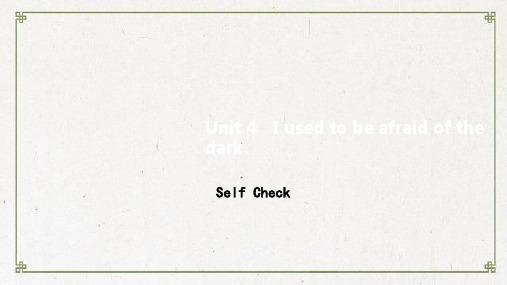
I could make myself happy again. It has been two years since I understood myself again.Whatever challenges life may bring , I'm used to communicating with the sevenyearold girl in the photo.She guides me through life. ( D )31.When did the writer have depression? A.At the age of 7. B.At the age of 12. C.At the age of 14. D.At the age of 16. ( B )32.What does the underlined word 〞suicide” mean in Chinese? A.逃避 B.自杀 C.放弃 D.折磨
Unit 4 I used to be afraid of the dark.
Self Check
(一)单项选择。 ( A )1.Lisa was ________ from the meeting because she had to look after her mother at home. A.absent B.present C.private D.silent ( A )2.—Did you watch the football match last night? —Yes.It was a close match.The ________ was 2 : 0 until the end. A.score B.match C.team D.player ( D )3.You should think of a way to your problems at once. A.begin with B.agree with C.talk with D.deal with
人教版英语九年级Unit 4《I used to be afraid of darks》全单元教学设
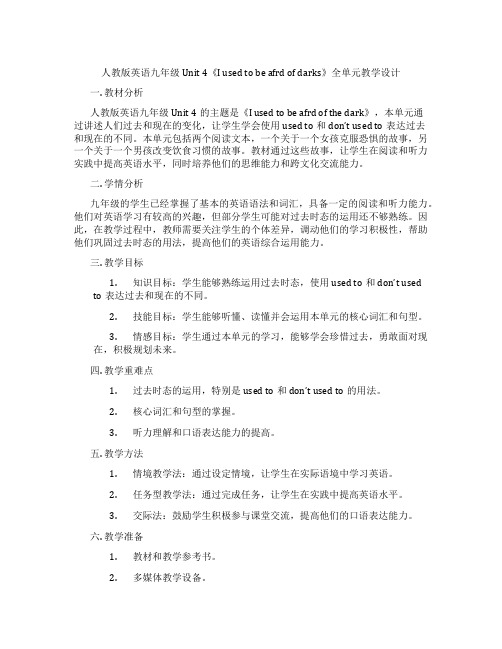
人教版英语九年级Unit 4《I used to be afrd of darks》全单元教学设计一. 教材分析人教版英语九年级Unit 4的主题是《I used to be afrd of the dark》,本单元通过讲述人们过去和现在的变化,让学生学会使用used to和don’t used to表达过去和现在的不同。
本单元包括两个阅读文本,一个关于一个女孩克服恐惧的故事,另一个关于一个男孩改变饮食习惯的故事。
教材通过这些故事,让学生在阅读和听力实践中提高英语水平,同时培养他们的思维能力和跨文化交流能力。
二. 学情分析九年级的学生已经掌握了基本的英语语法和词汇,具备一定的阅读和听力能力。
他们对英语学习有较高的兴趣,但部分学生可能对过去时态的运用还不够熟练。
因此,在教学过程中,教师需要关注学生的个体差异,调动他们的学习积极性,帮助他们巩固过去时态的用法,提高他们的英语综合运用能力。
三. 教学目标1.知识目标:学生能够熟练运用过去时态,使用used to和don’t usedto表达过去和现在的不同。
2.技能目标:学生能够听懂、读懂并会运用本单元的核心词汇和句型。
3.情感目标:学生通过本单元的学习,能够学会珍惜过去,勇敢面对现在,积极规划未来。
四. 教学重难点1.过去时态的运用,特别是used to和don’t u sed to的用法。
2.核心词汇和句型的掌握。
3.听力理解和口语表达能力的提高。
五. 教学方法1.情境教学法:通过设定情境,让学生在实际语境中学习英语。
2.任务型教学法:通过完成任务,让学生在实践中提高英语水平。
3.交际法:鼓励学生积极参与课堂交流,提高他们的口语表达能力。
六. 教学准备1.教材和教学参考书。
2.多媒体教学设备。
3.相关图片和视频资料。
4.练习题和测试题。
七. 教学过程1.导入(5分钟)利用图片和视频资料,引导学生谈论他们过去和现在的变化,激发学生的学习兴趣。
2.呈现(10分钟)讲解过去时态的用法,特别是used to和don’t used to的差别。
黄石专版2022九年级英语全册Unit4IusedtobeafraidofthedarkSelfCh

D.attention D.difficult D.happy D.which D.say D.because ugh D.spend D.herself D.give up
Ⅱ.阅读理解 I used to be selfish(自私的),I should say.But one moment changed me. I was on my lunch break and left the school to get something to eat.On the way,I
The boy answered back quickly, “To check my grades.”
“No, no,” his dad 6.replied calmly, “I am here to make you understand that you are the most important person for me. I want to see you 7.happy. I don’t care about grades. I care about you. Nothing could be 8.more valuable than your happiness. You are my life!”
Unit4Iusedtobeafraidofthedark.导学案人教版英语九年级全册

Unit 4 I used to be afraid of the dark.Section A【学习目标和重点、难点】1.熟练运用used to do sth.谈论自己、他人过去的习惯、爱好、形象及经常做的事情。
2.能够听懂有关学习方法的简短对话。
3.能运用used to来谈论过去。
【学习内容及学习过程】(一)要点导学导学①I used to be afraid of the dark .used to do sth.过去常常做某事。
用于过去式中, 表示现在已不存在的习惯或状态。
查阅资料,掌握used to的用法。
跟踪练习(1) He______ ______ ____________ after school. 放学后他过去常常踢足球。
(2) He ____ ______ _____ ___________________________. 他过去不吸烟。
(3)He used to play football. (改为一般疑问句,再回答)_____________________________________________________________________拓展:be/get used to doing sth 意思是“习惯做某事”;be used to do sth和be used for doing sth表示“被用来做什么”。
导学②You used to be short, didn’t you? 复习反意疑问句,完成练习:Lily will go to China, ______ _____?She doesn’t e from China, ________ ________?(3) You haven’t finished homework, _________ __ ?(4) He knows little English, _________ ______?导学③区别下面两句的意思:跟踪练习(1) 我记得给花浇过水了。
北大绿卡九年级英语全册 Unit 4 I used to be afraid of the dark

Unit 4 I used to be afraid of the dark(总分30分,时间30分钟)一、单项选择题(10分)1.______ important information he left for me! It’s of much ______ to me.A. What, useB. What an, useC. How, usefulD.How an, useful【答案】A【解析】试题分析:句意:他给我留下多么重要的信息啊!信息对我很有价值。
of value=valuable有价值的;感叹句为what+(a/an)+adj+n+陈述句,how+adj/adv+陈述句;important重要的,形容词,information信息,(不可数)名词,故选A.考点:考查感叹句。
2.The river near our village is about _______ long.A. three-hundreds-metresB. three-hundred-metreC. three hundreds metresD. three hundred metres【答案】D【解析】试题分析:句意:在我们村庄附近的那条河大约有300米长。
作定语时才用复合形容词的形式,排除A和B;具体数字+hundred的单数形式,排除C;故选D。
考点:考查数词。
3.John is ______ honest boy. He has ______ useful book.A. an; anB. a; aC. a; an D .an; a【答案】D【解析】试题分析:句意:约翰是一个诚实的男孩。
他有一本有用的书。
冠词作为一种虚词,只能和名词一起使用。
英语中的冠词分为不定冠词和定冠词。
不定冠词有两个,a 和 an。
a用在辅音开头的单词前面;an用于以元音开头的单词前。
不定冠词用在单数可数名词前面,表示这个人或事物是泛指的不确定的一个,相当于中文的“一个”。
黄石专版2022九年级英语全册Unit4Iusedtobeafraidofthedark单元同步作文

Ⅰ.描述人物过去和现在性格或外貌的句子 1.以前我不敢当众发言。 I used to be afraid of giving speeches in public. 2.迈克过去虚弱,但现在非常强壮,因为他每天做运动。 Mike used to be weak,but now he is very strong because he does sports every day.
要求:1.包含所有要点,适当发挥;语言通顺,意思连贯。 2.80 词左右。
Ⅰ.写作导图
Ⅱ.串联成文 Li Hua ogress this term. In the past,he
always fought with others. He ed to spend much time playing computer games(过去常常花大量时间玩电脑游戏). And he often ate junk food. In class,he 2.either ate or slept(要么吃东西要么睡觉). He could never pass any exams.
上周你们班召开了一次“告别陋习,走向文明”的主题班会,会上老师让你们 谈谈身边同学的变化。请你根据以下要点写一篇关于李华同学的文章。
要点:1.过去的表现:经常和同学打架;花很多时间玩电脑游戏;经常吃垃圾 食品;在课堂上吃东西、睡觉;考试不及格。
2.现在的表现:与同学相处融洽;积极参加各项活动;生活习惯健康;认真听 讲,按时完成作业;各学科都学得很好。
But now,he has changed a lot. He can get on well with the other students. He 3.takes an active part in all kinds of activities (积极参加各种活动). He has healthy living habits. He always listens to the teachers carefully in class and finishes his homework on time. And he does well in all subjects. We all like him now.
- 1、下载文档前请自行甄别文档内容的完整性,平台不提供额外的编辑、内容补充、找答案等附加服务。
- 2、"仅部分预览"的文档,不可在线预览部分如存在完整性等问题,可反馈申请退款(可完整预览的文档不适用该条件!)。
- 3、如文档侵犯您的权益,请联系客服反馈,我们会尽快为您处理(人工客服工作时间:9:00-18:30)。
பைடு நூலகம்
Miss Chen is _____ now, but she wusaesd__to__b_e. _____.
过去经常
She used to exercise from time to time. 时常
Changes
A
B
A: Did Miss Chen use to be thin ? B: Yes, she did.
Groupwork
outgoing quiet
…
2
1
humorous adj. 幽默的
humorously adv.
humor
n.
humorless adj.
silent
helpful adj. 有帮助的
helpfully adv.
helpless adj.
adj. 沉默的
silently adv.
last saw their
last saw our primary
A: This party is such a great idea!
Miss Chen’s list Personality
outgoing quiet silent humorous helpful shy noisy funny brave
clever smart/wise
hard-working
serious strict lazy nice / kind friendly easy-going
B._A__m_y__ Tina
C_T_i_n_a__ Mario
1b Complete the information according to what you hear.
1. Mario used to be __s_h_o_r_t__ . He used to wear __g_la_s_s_e_s_ .
silence n.
MThr eByebasonayiidsfasniulocethdhaitnhfgeunatensydt mawnaadnlkwedhaosashwoaas_hya_e_s_ls_ip_el_eln_e_ns_s_tes_l_yo._f .h__u_m__o_r. We like teachers who are _h__u_m_o_r_o_u_s_.
B: Yes, she did.
No, she didn’t. She didn’t use to ______.
A: Did she use to ______?
B: …
1b Listen and match the pictures with the names.
A._M__a_r_io_ Amy
A. got good scores on his exams B. used to be thin, too
A= Alfred G= Gina
pQr1i:mCDH..aBIosrtic’ywlshlyobsloehcoleahnncslogatchohssrialmsencegialytetaeedsssais.srnomscmsaeinutctceehhsw.e?ye
2. Amy used to be ___t_a_ll___ . She used to have __s_h_o_r_t__ hair.
3. Tina used to have ___r_e_d___ and __c_u_r_l_y__ hair.
Write as many wordsPaesrysoouncaalnittyo describe personality.
A: Did she use to wear a watch?
B: No, she didn’t.
She didn’t use to wear a watch.
She used notAto wear a watch.
B
Pairwork
Now
past
A: Did she use to ______?
2.She still plays in the _p_i_a_n_o_ from time
to time.
2b
Q: What’s the relationship(关系) between Paula and Steve?
A Mother and son. B Father and daughter. CC They used to be classmates.
1.NShoewwsahse’nsemveorre_b_irn_at_ev_re_esetneoduignh_st_po_oa_rs_tk_s. Sqhuesptiloanys._s_o_c_c_e_ralmost every day. She’s also on a __sw__i_m_ team.
2b Listen and complete the chart about how Paula has changed.
21..SPSSShahhheueeelwaugwosaauetsssdgeaaodtllwoostodaopyglgbasoreyoa_srdd_teih_eliaees_nln_l_i_ypn_mt__i___ia_qsun___c_nus___i_coiei___lc_ean____ts_.c_.s.e_. . She wasn’t very o__u_t_g_o_in__g .
…
be have wear
Appearance
tall / short young / old of medium height / build straight / curly hair long / short hair red / blonde hair
glasses a watch / a hat
Unit 4 I used to be afraid of the dark. Section A 1a-2d
We are new friends now.
Please describe your new friend—Miss Chen.
Find as many wordsAapspyeouarcaanctoe describe appearance. short
